
Copyright 2015 by Eric Jarosinski Cover art by Luc(as) de Groot Illustration of Theodor W. Adorno by Luc(as) de Groot.
Trademark Eric Jarosinski, 2014 The Theodor W. Adorno quotation on the epigraph page is translated by Eric Jarosinski and is taken from a conversation between Adorno and Max Horkheimer in Horkheimers collected works: Diskussion ber Theorie und Praxis, in Max Horkheimer,
Gesammelte Schriften, Nachgelassene Schriften 19491972. S. Fischer 1989. The publisher is grateful to S. Fischer Verlage for permission to quote.
Some material from the Afterword originally appeared in different form in the authors article #failedintellectual in The Chronicle of Higher Education. All rights reserved. No part of this book may be reproduced in any form or by any electronic or mechanical means, including information storage and retrieval systems, without permission in writing from the publisher, except by a reviewer, who may quote brief passages in a review. Scanning, uploading, and electronic distribution of this book or the facilitation of such without the permission of the publisher is prohibited. Please purchase only authorized electronic editions, and do not participate in or encourage electronic piracy of copyrighted materials. Your support of the authors rights is appreciated. Any member of educational institutions wishing to photocopy part or all of the work for classroom use, or anthology, should send inquiries to: Grove Atlantic, 154 West 14th Street, New York, NY 10011 or .
Printed in the United States of America FIRST EDITION
ISBN 978-0-8021-2437-1
eISBN 978-0-8021-9083-3 Black Cat
an imprint of Grove Atlantic 154 West 14th Street
New York, NY 10011
Distributed by Publishers Group West groveatlantic.com 15 16 17 18 5 4 3 2 1 The pleasure of thinkingit cannot be recommended. Theodor W. Adorno 
Its not hard to say no. Its hard to say it right. At the right time. For the right reasons.
Harder still to keep saying it, especially when we live in a world of yes. A tyranny of yes. Yes to family. Yes to friends. Yes to terms. Yes to conditions.
Yes to work. Yes to play. Yes to a life of yes, yes, and yes, please. But there is another life. An uncertain life. Of no. For no. For no.
Not just any no, however. A no of not now. Not yet. And not only. The no of Nein. Aesthetics: Art for the artless. Analytic philosophy: When mathematicians try their hand at poetry. Anxiety: Fear of the unknown. (Depression: Fear of the known.) Aphorisms: 1. (Depression: Fear of the known.) Aphorisms: 1.
Old ships in new bottles. 2. Philosophy for those with little Zeit. Written by those with little Geist. Art: The silence of the ancient mariners painted ship. Art history: The study of art without art. Art history: The study of art without art.
And history without history. Atheism: A religion without a prayer. Benjamin, Walter: The mourning of philosophy cut short by history. Book: A relic of the days when paper was wasted on words. Borges: Argentinas greatest German author. Capitalism: The ship of state rigged by pirates. (Communism: The ship of state rigged by the state.) Change: What you want. (Communism: The ship of state rigged by the state.) Change: What you want.
When, where, and how you do not want it. Close reading: The art of reading what has never been written in order to write a book that will never be read. Coffee: The diuretic of enlightenment. Cold War: A conflict too expensive to be fought, but too cheap for a Roman numeral. Commodity fetishism: Mistaking someones labor for something you would want to buy. Continental philosophy: What Europe does when its depressed. Craigslist: A casual encounter with the social contract. Culture: The cigarette not smoked after not having sex. Cynicism: The hope that someday you will have known better all along. Dead certainty: Socrates without a question. Deconstruction: Reading with a microscope. Deconstruction: Reading with a microscope.
Thinking with a hammer. And writing with an erasure. Degree: Devised by doctors to take ones temperature or tuition. Dialectics: A Werner Herzog documentary narrated by Klaus Kinski. Diplomacy: The art of turning swords into plowshares. Plowshares into tractors.
And tractors into tanks. Discretion: An undertaker who never says die. Elegy: Pathos played in a minor key. Emoticon: Symbol expressing an emotion we can no longer express in the form of a face we can no longer countenance. English: A language everybody speaks but nobody can spell. Europe: A continent tied to the left that drifts to the right. Failed intellectual: One who tries to intellectualize ones failure. And fails. And fails.
At times brilliantly. Foreign policy: The logical extension of illogical domestic policies. Frankfurt School: An institute that taught us to read Freud like Marx. Marx like Hegel. And Adorno like Adorno. French theory: Americans who still smoke. Freudian slip: When the unconscious speaks in tongues. Fundamentalism: A literal misreading of the misunderstood. Genius: When sadness speaks to loneliness. Genius: When sadness speaks to loneliness.
And laughs. German: A language invented for philosophy but used to build automobiles. German beer: Carefully brewed in accordance with purity, and slowly poured in defiance of gravity. German literature: Where protagonists go to die. God: 1. 2. 2.
The monster over our beds. GOP: An American political party devoted to the principle of one nation under God. And one above. Graduate school: Related fields seeking advanced degrees of separation. Grammar: IKEA assembly instructions that are different in every country. Happiness: A feeling of well-being appreciated once it has stopped. Hegel: A philosopher best understood if never read. Hermeneutics: The science of reading text messages. (Critical Hermeneutics: The art of deleting them.) Hipster: Indifference wasted on the young. History: The victors present for the vanquished. Hope: A beacon made of fog. Humanism: The sober realization that were all weve got. Ideology: The mistaken belief that your beliefs are neither beliefs nor mistaken. Instability: When capital is frightened by its own shadow. Instagram: A marketplace in which pictures of your cat are exchanged for a thousand unspoken words of derision.

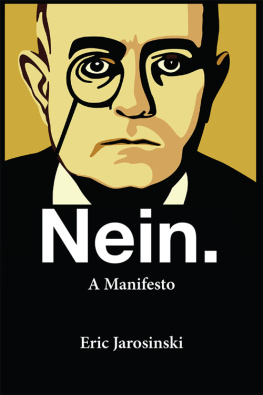
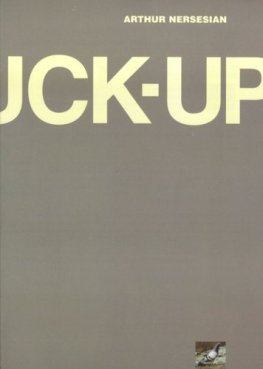


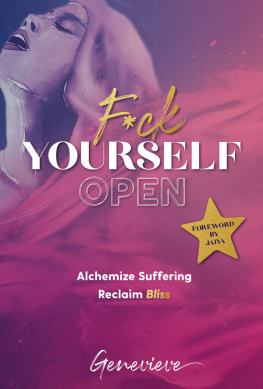
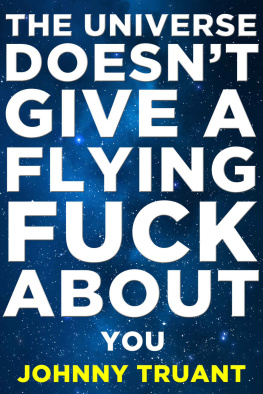
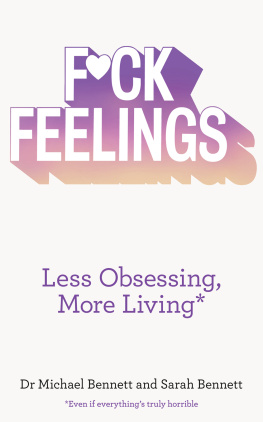
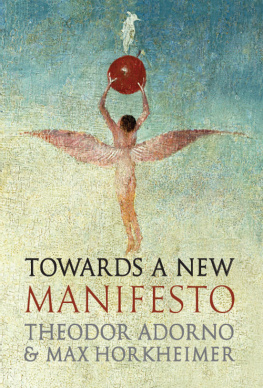
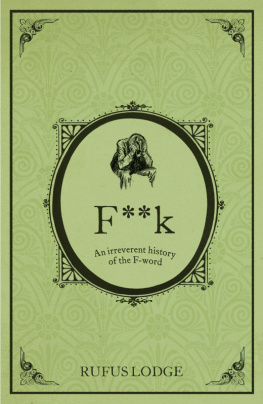
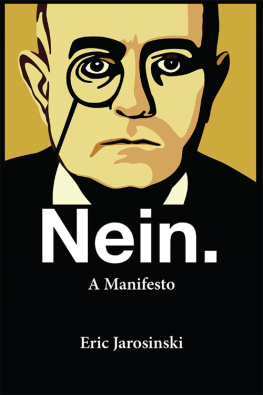
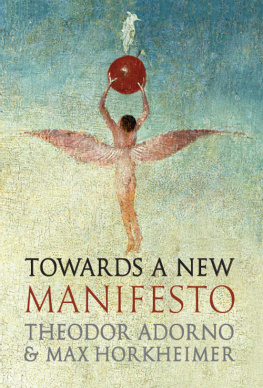
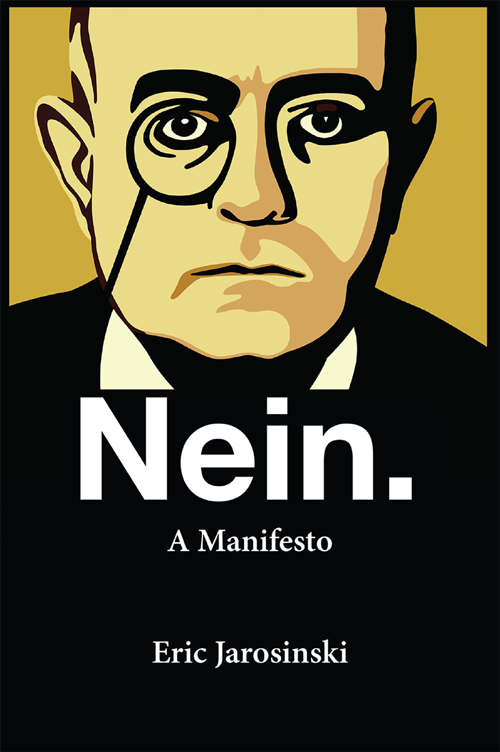
 Copyright 2015 by Eric Jarosinski Cover art by Luc(as) de Groot Illustration of Theodor W. Adorno by Luc(as) de Groot.
Copyright 2015 by Eric Jarosinski Cover art by Luc(as) de Groot Illustration of Theodor W. Adorno by Luc(as) de Groot.